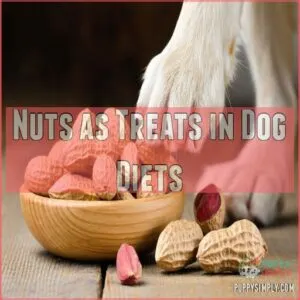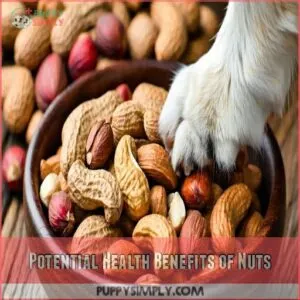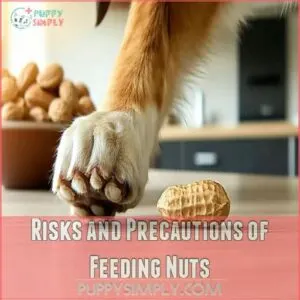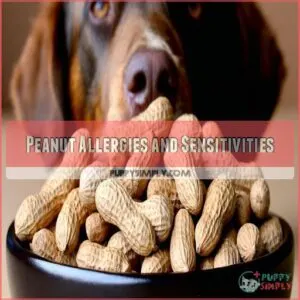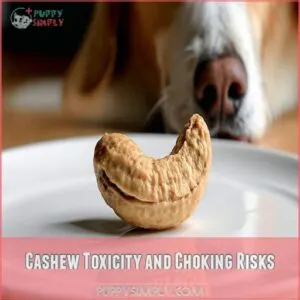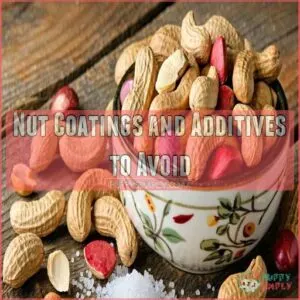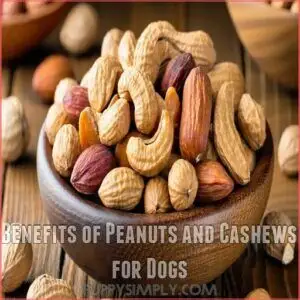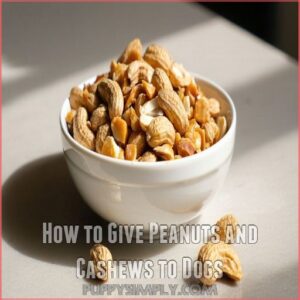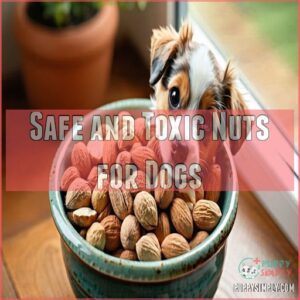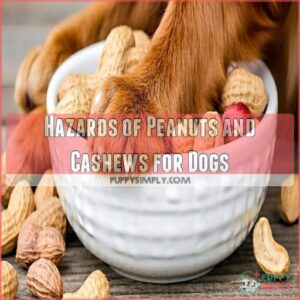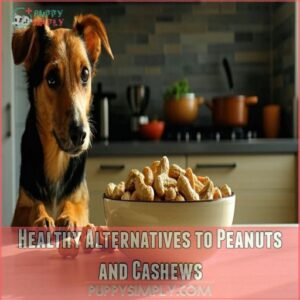This site is supported by our readers. We may earn a commission, at no cost to you, if you purchase through links.
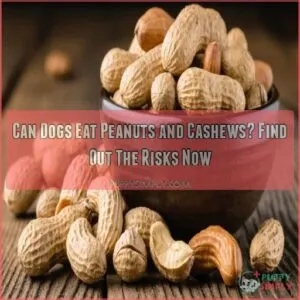 Yes, dogs can eat peanuts and cashews, but you must proceed with caution.
Yes, dogs can eat peanuts and cashews, but you must proceed with caution.
These nuts can serve as an occasional treat, but they shouldn’t form a staple in your dog’s diet.
Make sure they’re unsalted and without added flavors, as these can upset your dog’s stomach.
While peanuts offer protein, and cashews provide healthy fats, feeding them in moderation is key to avoid weight gain or pancreatitis.
Be aware of potential allergies and choking hazards.
If you’re ever in doubt, a chat with your vet can shed light on what’s best for your furry friend.
Curious about other nut risks? Keep reading!
Table Of Contents
- Key Takeaways
- Can Dogs Eat Peanuts and Cashews Safely
- Are Peanuts and Cashews Safe for Dogs
- Benefits of Peanuts and Cashews for Dogs
- How to Give Peanuts and Cashews to Dogs
- Safe and Toxic Nuts for Dogs
- Hazards of Peanuts and Cashews for Dogs
- Healthy Alternatives to Peanuts and Cashews
- Frequently Asked Questions (FAQs)
- Can dogs eat cashew nuts?
- How should one consume cashew nuts?
- Can dogs eat peanuts?
- How many cashews should a dog eat?
- Can dogs eat cashew milk?
- Can dogs eat cashew butter?
- Are peanuts safe for dogs?
- Are any nuts toxic to dogs?
- Can dogs eat cashews?
- Is peanut butter good for dogs?
- Can dogs have peanut butter made from cashews?
- Are roasted or raw nuts better for dogs?
- Can dogs with allergies eat peanuts and cashews?
- What is the maximum amount dogs can eat?
- Do peanuts and cashews affect dog training routines?
- Conclusion
Key Takeaways
- Always give your dog unsalted, plain peanuts and cashews in moderation to prevent weight gain and health issues.
- Keep an eye out for allergies; symptoms like itching or vomiting could indicate a problem, so consult your vet if needed.
- Avoid nuts with coatings, additives, or xylitol, as they can be harmful or even toxic to your dog.
- Chop or grind nuts to prevent choking hazards, especially for smaller dogs, and stick to small portions.
Can Dogs Eat Peanuts and Cashews Safely
You might wonder if giving your dog peanuts or cashews is a safe treat option. Some pet owners even use peanuts in creative ways, like mixing CBD peanut butter recipes to provide a natural calming aid.
While these nuts can offer some health benefits, it’s important to be aware of the risks and take necessary precautions to keep your pup healthy.
Nuts as Treats in Dog Diets
Ever wondered if nuts make good treats for your furry friend?
Peanuts and cashews can add variety to your dog’s diet, but moderation’s key.
Keep portions small and avoid reaching for those fancy coated ones.
Nut safety for puppies and seniors is essential, so stick to plain, unsalted varieties.
Worried about nut allergies in dogs, consider looking into the benefits of a probiotic for dogs with allergies, probiotics for allergies, as they can help reduce allergy symptoms. Worried about nut allergies in dogs? Always observe after initial taste.
Potential Health Benefits of Nuts
So, you’re thinking about giving your pup some nuts? Smart move! Nuts offer some real nutritional perks. Let’s look at the good stuff:
- They’re packed with protein, building those strong muscles.
- Healthy fats give your dog energy and a shiny coat.
- Fiber keeps their tummy happy.
It’s all about moderation, though. We’ll talk about the things to watch out for next.
Risks and Precautions of Feeding Nuts
Nuts can be tricky treats for dogs.
They’re calorie-dense, posing overfeeding risks.
Watch out for peanut allergies and cashew choking hazards.
Avoid nuts with xylitol, a real danger.
To prevent mold concerns, consider using a dog nut mold to keep your dog’s treats fresh.
Mold concerns add another layer of caution.
Here’s a quick look:
| Risk | Problem |
|---|---|
| Nut Allergies | Skin irritation |
| Mold Concerns | Toxic reactions |
| Xylitol Dangers | Poisoning |
| Choking Prevention | Safety in serving sizes |
Are Peanuts and Cashews Safe for Dogs
When considering peanuts and cashews for your dog, you need to weigh potential allergens and choking hazards. It’s essential to stick to plain versions without any harmful coatings or additives.
Peanut Allergies and Sensitivities
Wondering if peanuts are safe for your dog? Just like people, dogs can have peanut allergies, causing troublesome symptoms like itching or vomiting. Understanding peanut allergy management means keeping an eye out for these signs. Here’s how to handle it:
- Peanut Allergy Symptoms: Watch for itching.
- Peanut Allergy Testing: Consult your vet.
- Peanut Allergy Management: Follow vet guidance.
- Peanut Allergy Prevention: Avoid risky treats.
Cashew Toxicity and Choking Risks
You might think cashews are a harmless snack for your dog, but watch out for their size and potential choking hazards. Cashew allergies aren’t common, but they can occur.
| Factor | Risk | Solution |
|---|---|---|
| Cashew size | Choking hazards | Break into pieces |
| Cashew allergy | Rare reactions | Introduce slowly |
| Safe amount | Weight issues | Moderate servings |
Stick to a safe cashew amount for your dog’s well-being.
Nut Coatings and Additives to Avoid
After tackling cashew risks, let’s focus on the sneaky dangers lurking in nut coatings. Always avoid:
- Salt and Sugar: Dogs don’t need extra sodium or sweetness leading to health issues.
- Spices and Xylitol: These can be deadly, causing severe reactions.
- Chocolate-Covered Nuts: Chocolate is toxic to dogs, risking severe illness.
Keep these off Fido’s menu!
Benefits of Peanuts and Cashews for Dogs
Consider adding peanuts and cashews to your dog’s diet for their protein, healthy fats, and essential vitamins.
These nuts can support muscle growth and provide a nutrient boost, but always serve them in moderation for the best results.
Protein and Healthy Fat Content
A balanced diet for your dog includes protein and healthy fats.
Peanuts and cashews offer both!
Peanuts boast protein for muscle building, while cashews provide healthy fats for energy.
Remember, moderation is key for weight management.
Too many nuts can upset their tummy or lead to weight gain.
A nut-rich diet should be a small part of a balanced plan.
Always check with your vet before adding new foods to your dog’s diet.
Vitamins and Minerals in Peanuts and Cashews
Peanuts and cashews can be tiny powerhouses of nutrition for your pup, offering an array of essential vitamins and minerals.
Peanuts specifically provide vitamin B6 for healthy brain function, as well as vitamin E acting as an antioxidant learn more about peanut benefits.
They provide B vitamins for energy and healthy coat, along with essential minerals like magnesium and phosphorus supporting bone health.
When comparing peanuts vs. cashews, both nuts pack a punch in nutritional value, making them a beneficial treat in moderation.
Omega-3 Fatty Acids in Nuts
Beyond vitamins, omega-3 fatty acids in nuts like walnuts can boost your dog’s well-being, improving everything from skin and brain health to joint flexibility.
You can also find peanut-based treats that incorporate these beneficial fatty acids, such as dog peanut treats online, which can be a tasty and healthy reward.
Think of these nutrients as the superheroes of nutrition, ready to fight inflammation and support a shiny coat.
Remember, moderation is key; too much can tip the scales toward tummy troubles and weight gain.
How to Give Peanuts and Cashews to Dogs
When you’re ready to share peanuts and cashews with your dog, focus on preparing these nuts properly to make sure they’re safe to eat.
Always chop them into small pieces and control the portion size to prevent choking and weight gain.
Roasting and Preparation Methods
As you explore the benefits of peanuts and cashews for dogs, consider their preparation.
Roasting nuts enhances flavor, but follow these steps:
- Roast at 350°F: This temperature makes sure the nuts are cooked without burning.
- 15-Minute Timer: Prevent overheating.
- Cool Before Serving: Avoid burns and aid digestion.
- Store in Airtight Containers: Keeps them fresh and safe.
Chopping and Grinding Nuts for Safety
Thinking about your dog’s safety, chopping or grinding nuts like peanuts and cashews can prevent choking hazards.
Consider their chewing ability and breed size when preparing these snacks.
Smaller pieces make digestion easier and reduce risks, giving you peace of mind.
Remember, texture impacts how comfortably they can munch away, turning a regular treat into a safer delight.
Dosage and Portion Control
When offering peanuts and cashews to your dog, think small: a safe amount depends on dog size and nut frequency.
Even small amounts of certain nuts like almonds can be hazardous, posing risks of pancreatitis and obstruction risks.
Aim for a treat ratio that minimizes weight impact—nibble, don’t gorge.
Use the "pinky nail" rule: no more than a couple tiny pieces per snack session. This makes sure they stay a fun treat without unwanted belly trouble.
Safe and Toxic Nuts for Dogs
You’ll find that some nuts, like peanuts (in moderation!), are generally okay for your canine companion, while others, such as macadamia nuts, are downright dangerous and should be avoided completely.
Knowing which nuts are safe and which are toxic is essential for keeping your furry friend healthy and happy.
English Walnuts Vs Black Walnuts
Wondering if walnuts are okay for your pup? English walnuts come out as the safer choice for dogs, offering some health benefits when given in moderation.
On the flip side, black walnuts are like a bad apple—highly toxic for dogs.
Remember these simple tips:
- Stick to English walnuts.
- Avoid black walnuts entirely.
- Watch portions to prevent issues.
Macadamia Nuts and Their Toxicity
Macadamia nuts may be delicious for you, but they’re a no-go for dogs.
Just a small handful can lead to serious issues like weakness, tremors, and vomiting.
Dogs react much differently than humans to these nuts, highlighting the importance of dog safety.
Consider these alternative treats:
| Safe Treats | Benefits |
|---|---|
| Carrot sticks | Low-calorie, crunchy |
| Apple slices | High in fiber, vitamins |
| Green beans | Rich in nutrients |
Other Toxic Nuts to Avoid
Curious about toxic nuts for dogs. While peanuts and roasted cashews are considered safe in small amounts, it’s essential to know what nuts can dogs eat?
Some—including Brazil nuts, pine nuts, and chestnuts—are on the toxic nut list due to their dangers.
Brazil nuts can cause selenium poisoning, and chestnuts pose choking risks.
Walnuts, especially black ones, and pine nuts can upset your dog’s stomach.
Keep your furry friend safe by avoiding these hazardous options.
Always consult your vet!
Hazards of Peanuts and Cashews for Dogs
Feeding peanuts and cashews to your dog might seem harmless, but these nuts can pose significant health risks.
Be aware of potential choking hazards, allergic reactions, and the risk of pancreatitis when considering these treats for your pet.
Choking Risks and Obstruction
Shifting from toxic nuts, let’s talk about choking risks.
Small breed dogs are especially prone to choking hazards, similar to the risks posed by acorns from oak trees like gastrointestinal distress.
The size of peanuts and cashews can be tricky; they’re like mini boulders for tiny throats.
Practice safe feeding to protect your pup. Chop nuts into smaller pieces or grind them to sidestep dog breed variations and keep snack time safe.
Allergic Reactions and Anaphylaxis
Let’s face it, even peanuts and cashews can trip up dogs into serious situations.
Allergic reactions aren’t just about sneezing.
Watch for these signs and symptoms:
- Itching and Hives: Like that pesky rash you dread.
- Swelling: Especially around the face.
- Breathing Trouble: A wheezy sound? Get help.
- Vomiting: A not-so-subtle red flag.
Treatment and prevention keep allergies at bay.
Pancreatitis and Gastrointestinal Upset
Severe allergic reactions aren’t the only worry. High-fat nuts can upset your dog’s tummy, causing diarrhea or vomiting.
Worse, nut-induced pancreatitis is a risk, especially with a high-fat diet. This inflammation of the pancreas can be serious.
Prevent problems by offering nuts sparingly, if at all. Some dogs can even enjoy hydration alternatives like coconut water. Safe nut alternatives, like certain fruits and veggies, are better choices. Always check with your vet about your dog’s dietary needs.
Healthy Alternatives to Peanuts and Cashews
If you’re looking for healthy snack options for your dog, fresh fruits and vegetables can be great alternatives to peanuts and cashews.
Consider vet-approved dog treats or try making homemade recipes that are both safe and delicious.
Fresh Fruits and Vegetables as Treats
Why not try fruits and veggies as alternatives? They’re safe, offer dietary benefits, and are great treats for picky eaters.
Apples and carrots are top choices, but be sure to avoid grapes and onions.
You can also explore other dog safe fruits to add some variety.
Think seasonal options like watermelon in summer.
With homemade recipes, you can keep your pup healthy and happy!
Always check for safety before feeding.
Vet-Approved Dog Treats and Snacks
When looking for healthy snack ideas for your pup, check out vet-approved dog treat brands.
These commercial treats are crafted to guarantee your furry friend’s safety and nutrition.
Opt for options that highlight wholesome ingredients, steering clear of additives.
Among popular dog snack brands, choose those with simple, transparent labels, guaranteeing that your dog’s treats are as thoughtful as your own meals.
Homemade Treats and Recipes
Tired of store-bought options? Homemade treats can keep your pup wagging.
Try these DIY favorites:
- Peanut Butter Bites: Simple mix of oats and dog-friendly peanut butter.
- Cashew-Based Treats: Mash cashews into dough for crunchy delights.
- Healthy Dog Snacks: Combine pumpkin puree and whole wheat flour for tasty biscuits.
Whip up love with these homemade dog treats, like dog-friendly ice cream made with peanut butter and bananas, instead of chocolate ice cream dangers. Whip up love with these homemade dog treats!
Frequently Asked Questions (FAQs)
Can dogs eat cashew nuts?
Cashews aren’t toxic, but they’re not ideal.
They can be a choking hazard, especially for smaller dogs.
Offer small, chopped pieces as an occasional treat, not a regular part of their diet.
How should one consume cashew nuts?
Enjoy cashew nuts by toasting them lightly for enhanced flavor and crunch.
Cashews can be mixed into stir-fries, salads, or enjoyed as a snack.
Remember, moderation is key due to their high-calorie content. Stay mindful of portion sizes!
Can dogs eat peanuts?
Yes, dogs can eat peanuts, but stick to unsalted, uncoated types.
In moderation, they’re a good protein source.
Watch for allergic reactions and avoid peanuts with added ingredients like chocolate or xylitol, which are harmful.
How many cashews should a dog eat?
Did you know that too many cashews could cause tummy troubles for your furry friend?
Limit your dog’s intake to a few unsalted cashews a week to prevent weight gain and digestive issues.
Always consult your vet first.
Can dogs eat cashew milk?
Cashew milk isn’t a great choice for dogs due to its high fat content and potential additives like sugar or xylitol, which are harmful.
Always consult your vet before adding new foods to your dog’s diet.
Can dogs eat cashew butter?
You can give your dog cashew butter in small amounts.
It’s packed with healthy fats and proteins, but its high-fat content risks weight gain and pancreatitis.
Avoid brands with added salt, sugar, or xylitol.
Are peanuts safe for dogs?
Peanuts are generally safe for dogs if they’re plain, unsalted, and in moderation.
They offer protein and healthy fats, but their high-calorie content means you shouldn’t go overboard—too many can lead to weight gain.
Are any nuts toxic to dogs?
Yes, some nuts are downright dangerous for your furry friend. Macadamia nuts, black walnuts, and Brazil nuts can cause serious problems. Always check before sharing your snacks!
Can dogs eat cashews?
Curious about cashews for your canine?
Cashews are safe but serve them sparingly.
They’re high in fat, which can lead to weight gain or pancreatitis.
So, when treating your pup, moderation is more than just a mantra!
Is peanut butter good for dogs?
Peanut butter can be a tasty treat for dogs if it’s free of xylitol, a harmful sweetener. German Shepherds can eat peanut butter in moderation as an occasional peanut butter treat.
Choose unsalted varieties in moderation to avoid weight gain and digestive issues.
Always check the label for safe ingredients.
Can dogs have peanut butter made from cashews?
Imagine your dog eyeing that jar of cashew butter.
While it sounds yummy, limit it.
Cashew butter’s delectable and safe in moderation, but watch for added sugars or xylitol, which are harmful to dogs.
Are roasted or raw nuts better for dogs?
Feed nuts roasted to your dog, not raw, to avoid mold that can make them sick.
Always watch for coatings or seasonings that could harm them.
Chop them up to minimize choking risks and consult your vet.
Can dogs with allergies eat peanuts and cashews?
Picture your pup sniffing curiously at some nuts.
Dogs with allergies might handle peanuts and cashews poorly, risking itching or worse.
Always ask your vet about safe treats for your dog’s unique health needs.
What is the maximum amount dogs can eat?
For peanuts and cashews, aim for moderation.
Offer a few unsalted, shelled peanuts or a couple of cashews occasionally.
Maximum quantity depends on your dog’s size and health.
Always consult a vet for personalized advice.
Do peanuts and cashews affect dog training routines?
Think your dog’s training’s going south?
Stick to small, easily digestible rewards to keep your pup focused.
Peanuts and cashews, while sometimes okay, aren’t training treats.
Avoid surprises; consistency is key!
Conclusion
Wondering why your dog can’t enjoy peanuts and cashews like you do?
While they can eat these nuts, moderation is key.
Stick to unsalted varieties to avoid upsetting their stomach.
Keep an eye out for allergies and choking hazards; even tiny pieces can be tricky.
Consult your vet if you’re unsure.
Remember, while peanuts and cashews offer protein and healthy fats, they’re a treat, not a main course.
Keep your dog’s diet balanced and safe!

